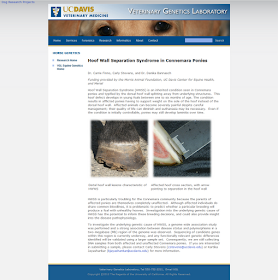The research into HWSS
is the result of the dedication and perseverance of a few private
individuals who rose to the challenge to provide the scientific
evidence required to support their working hypothesis.
The research group made a tentative approach to
researchers at the Bannasch Laboratory back in April 2011. Because of the high standing worldwide that this laboratory has in the area of equine genetic research the group considered that any work performed by them would be well beyond any reproach .
Although interested to be involved at a
personal level, the researchers told us that to conduct the necessary initial GWAS required money –
lots of money which the group did not have and until we could fund the study, there was little they could do to help. However Bannasch did make the offer to the group that if
samples were submitted to them they would extract the DNA and then store this
for the future; an offer which was gratefully accepted.
The turning point came
when Rosewood Witchcraft was taken to the Centre for Equine Health
for a clinical workup. Thank you so much Darian, you had no idea
what this action would precipitate.
Rosewood Witchcraft's facebook page
Until 'Crafty' was
'seen in the flesh' the researchers really had no conception of just
what the severity of this condition was. Photographs just DO NOT
illustrate how dramatic this condition can be.
Shortly after Crafty's
visit another affected pony made the journey to UC Davis.
These clinical
examinations was the spur needed to get official,
professional interest underway to research into the causes and
origins of HWSS.
But of course 'we'
still needed money – lots of money; thus this blog was created.
To all of you private
individuals who rose to the occasion and donated funds to UC Davis to fund the GWAS and subsequent gene sequencing;
THANK YOU FROM THE
BOTTOM OF OUR HEARTS
it could not have
happened without you.
The influx of funds to UC Davis allowed the initial GWAS to start. Because of the great start to
fundraising UC Davis approached the Morris Foundation to apply for a
dollar for dollar grant. This grant application was accepted and the Morris
Foundation and two other sponsors are continuing to support the ongoing research.
BUT IT WAS 'YOUR' MONEY THAT STARTED THE BALL ROLLING
without the
initial financial support from mainly private individuals within the
worldwide Connemara Pony community the grant from the Morris
Foundation would not have eventuated, nor that of the other two sponsors.
At this point the
Connemara Pony Research Group would like to formally acknowledge the following
organisations for their financial support of the research:
- American Connemara Pony
Society
- Region 111 of the
American Connemara Pony Society
- Ulster Connemara Pony
Breeder's Association (previously known as Northern Ireland Connemara
Pony Breeder's Association)
- Connemara.nu (an
independent Swedish organisation which collected private donations on behalf, specifically for this project)
The above funds
combined to approximately a third of the total monies donated; the balance came
from private individuals. Other than the official notifications
received from the mentioned organisations, the research group has no
information as to who made donations to the fund.
Another result of this
blog is that many owners of affected ponies around the world made
contact with the research group.
People who emailed the group were put into direct contact with their country representative in the group. Much work has
been performed by these representatives on behalf of both the pony owners
and the research group. Without this input of samples from so many
different countries, Bannasch could not have made progress as quickly
as they have.
Blood collections and
co-ordinated shipping of samples to Bannasch for DNA extraction
(which each participating pony owner paid for themselves) have been made
from Denmark, Germany/Austria, Canada, USA, Sweden and New Zealand.
UC Davis are now
calling for further sample submissions.
NOW is the time for the
'ordinary' breeders and owners to unite and to become involved in
this ground breaking research.
Contact the research
group for help if you wish to be part of submitting samples in a
co-ordinated response or UC Davis direct, if this should be your
preferred option.
